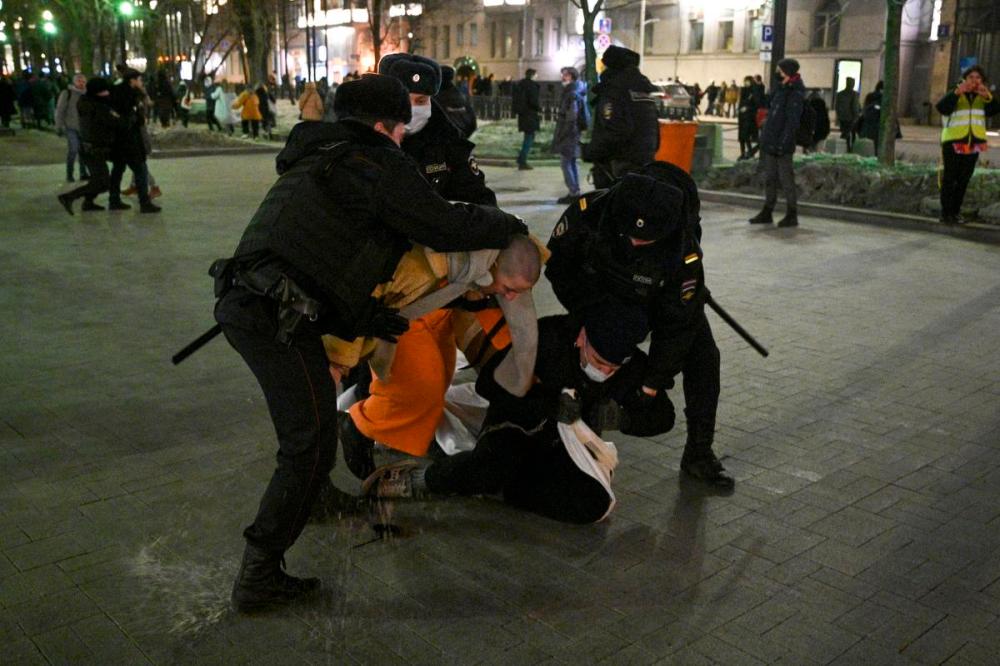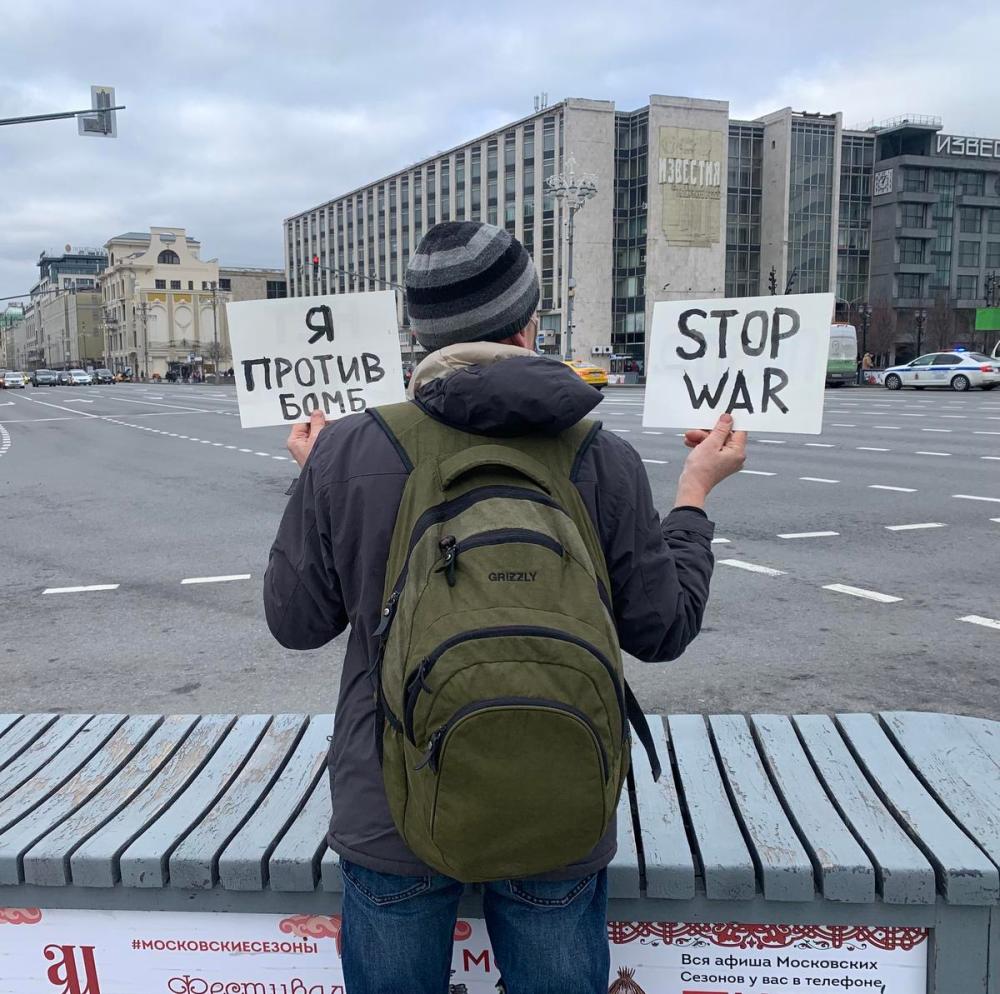As Russia attacks Ukraine, Moscow’s mood is tense, amid acts of courageous defiance
Advertisement
Read this article for free:
or
Already have an account? Log in here »
To continue reading, please subscribe:
Monthly Digital Subscription
$0 for the first 4 weeks*
- Enjoy unlimited reading on winnipegfreepress.com
- Read the E-Edition, our digital replica newspaper
- Access News Break, our award-winning app
- Play interactive puzzles
*No charge for 4 weeks then price increases to the regular rate of $19.00 plus GST every four weeks. Offer available to new and qualified returning subscribers only. Cancel any time.
Monthly Digital Subscription
$4.75/week*
- Enjoy unlimited reading on winnipegfreepress.com
- Read the E-Edition, our digital replica newspaper
- Access News Break, our award-winning app
- Play interactive puzzles
*Billed as $19 plus GST every four weeks. Cancel any time.
To continue reading, please subscribe:
Add Free Press access to your Brandon Sun subscription for only an additional
$1 for the first 4 weeks*
*Your next subscription payment will increase by $1.00 and you will be charged $16.99 plus GST for four weeks. After four weeks, your payment will increase to $23.99 plus GST every four weeks.
Read unlimited articles for free today:
or
Already have an account? Log in here »
Hey there, time traveller!
This article was published 24/02/2022 (1387 days ago), so information in it may no longer be current.
MOSCOW Even the smallest act of defiance in Russia takes a giant dose of courage.
That is the way it was in Soviet times. And that is the way it was the day that Russia invaded Ukraine.
A day that began before the sun rose with Russian President Vladimir Putin’s paranoid justification for war: an attack by the West against Russia was a certainty unless Russia brought to bloody completion the brutal military buildup on Ukraine’s borders.

“You and I,” he said, “simply have not been left with any other opportunity to protect Russia, our people, except for the one that we will be forced to use today.”
As a journalist who’s been observing the bobbing and weaving between Moscow, Washington, Brussels and Kyiv, Putin’s words brought a horrible certainty that had been absent in the many frantic days leading up to it.
At long last, there was no question in the morning about how the day would end.
No wondering when and where Putin would appear in public. No guessing at how he might torque up pressure on his western adversaries. No need to parse imminent warnings from the White House about the bloody hell awaiting Ukraine and its people when Russian forces rolled over the border.
But in the three hours between slipping, exhausted, into bed and waking up Thursday morning, everything had changed.
The children of journalists are perhaps unhealthily aware of world events. When I gathered my kids in to tell them that Russia had invaded Ukraine, my son informed me of each of his friends’ families’ exit plans in the event of an escalation. They would flee — to London, to Paris, to safety.
Thursday was supposed to be spent shopping for winter socks and gloves.
This week in Russia is the winter school break. A ski trip in Sochi was in the plans, but the invasion has prompted aviation carriers and authorities to suspend flights. In July 2014, Malaysia Airlines Flight 17 was shot down by pro-Russian rebels, killing 283 passengers and 15 crew members. Even in Russia, there are some mistakes of the past authorities have no desire to repeat.
Family friends who preceded us to the slopes that hosted the 2014 Winter Olympics are now stranded in Sochi — temporarily, at least — where talk of snow quality has been overtaken by the fight between Russia’s Slavic neighbours on the other side of the Black Sea coast.
Our travel plans dashed, our schedule suddenly freed, I proposed to my nine-year-old daughter a walk through central Moscow. I bought her agreement with the offer of lunch at the McDonald’s across from the Kremlin.
In truth, I wanted to test what I had read on social media. About a beefed-up police presence. About officers conducting random searches. About a capital on a heightened state of alert.
There was a bit of that, but not what most would imagine.
Like in any big city, life went on in the Russian capital, even in the most distressing of circumstances. Muscovites rushed about, socializing, smoking and shopping as they would on any other Thursday. But some things stood out.
The guards at the Presidential Administration building, not far from Red Square, were armed with automatic rifles. I don’t remember having seen that before. There was a clearly augmented police presence, but it wasn’t over the top.
I’ve certainly seen more in my four years in Moscow, like when the city was turned into a veritable fortress during protests over the prosecution of opposition leader Alexei Navalny last year.
The police presence at the Belarus embassy as well is notably increased, but it’s been that way for at least a week before invasion of Ukraine was announced. The scene there is something like what it was after the contested election victory of President Alexander Lukashenko in 2020, when there were mass protests and mass arrests.
Which is to say that there were visibly more of the big white and blue police buses parked about the city, idling the day away. But they served more as a deterrent a police shelter from the cold than anything else.
After McDonald’s, we passed through an underground walkway leading from the Kremlin to Tverskaya Street, Moscow’s main boulevard, when I spotted fresh graffiti on a white-tiled column. The message — “Putin is a murderer!” — was a rare bold gesture in black permanent marker, though it has probably already been scrubbed away by now.
Dissent isn’t permitted much oxygen — not in Russia and certainly not in Moscow, a stone’s throw from the Kremlin Wall. It has always been thus.
Dissident poet and translator Natalia Gorbanevskaya was sentenced to three years in a psychiatric institution, treated for “sluggish schizophrenia” for the crime of protesting the Soviet invasion of Czechoslovakia in 1968 in the middle of Moscow’s Red Square.
In 2008, she recalled being surrounded by a hostile crowd that day who surrounded her and her newborn child. They berated her with political lines that echo even to this day: that Prague was being liberated by the 500,000 Soviet troops; that it was being pulled back from the clutches of the Americans and the West.
Putin said much the same of Ukrainian President Volodymyr Zelenskyy and the pro-western governments elected by Ukrainians after a revolution in 2014. The invasion’s goal was “to protect people who have been subject to bullying and genocide by the Kyiv regime for eight years.”

“Our plans do not include the occupation of Ukrainian territories,” he said.
But not everyone here believes him and not everyone agrees what he has done is necessary.
Continuing up Tverskaya Street, my daughter and I went next to the Ukrainian embassy. Beyond the workers jackhammering asphalt and a small lineup of anxious-looking people waiting for consular assistance, there was a commotion.
One of the white and blue police buses was rolling up to the crowd assembled across the street from the embassy just as we arrived. Out jumped a group of police officers to forcefully separate two female protesters from the Russian reporters and camera operators, on hand to capture the inevitable outcome of their demonstration.
Left behind were a half-dozen stray roses, carnations and other frigid flowers that had been slipped into a green metal fence with handwritten messages: “No war,” read one. “We are with you,” read another.
The protesters gone, the camera operators and photographers went back into waiting mode, hoping to catch sight of Ukrainian diplomats being evacuated from Russia, as Kyiv formally severed ties with Moscow.
We continued on, back to Tverskaya, toward Pushkin Square. There, the first McDonald’s restaurant contrasts with the brutalist building across the street housing the legendary Soviet newspaper Izvestia, and both of them look onto the statue of Russia’s 19th-century Shakespeare, Alexander Pushkin.
My little girl was cold. I promised her we would take the bus. But then we spotted Ilya Povyshev, who had come to one of the city’s most iconic squares with two signs, one in English reading “Stop War,” the other in Russian reading “I am against bombs.”
An engineer from the Moscow region and a Russian citizen, Povyshev had greater fears than being hauled away by the police.
His wife and granddaughter were in Kyiv when Russian forces crossed into the country, and they were trying to make their way to a safe place, hoping to find it in Lviv, in the west, near the Polish border.
Povyshev stood alone in Moscow, spreading his message to the midday drivers in the passing cars. He said everyone he knows is against the invasion.
On Thursday night, with reports of Russian military advances and bombing raids across Ukraine, thousands took to the streets to denounce the invasion that was launched by Putin in their names. They came out not only in Moscow and St. Petersburg but in Ekaterinburg and Kazan and Ufa and in Siberian towns like Perm and Novosibirsk and Irkutsk.
Police responded with little tolerance, arresting some 1,700 people, according to OVD-Info, a group that tracks arrests.
Leading up to the invasion, the majority were on Putin’s side, with 60 per cent of respondents telling the Levada Centre polling firm they believed the Kremlin’s line — that the U.S. and the NATO military alliance were at fault in the escalation over Ukraine.
It’s tough to tell how Russians really feel. Maybe because they have seen time and again in their history that making that a small act of defiance — to visibly, audibly disagree — leads more often to personal problems than to public change.
How do you explain that to a nine-year-old? I didn’t try. I treated our walk through Moscow like a take-your-kid-to-work day: This is what a journalist does. He finds people in unusual situations, talks to them and tells their story.
And then she informed me that while I was busy chatting up Povyshev at Pushkin Square, I’d missed an important point. Perhaps the most important point of all.
A passing driver honked his horn, she said, and clapped his hands in support.
Allan Woods is a Moscow-based reporter for the Star. Follow him on Twitter: @WoodsAllan



